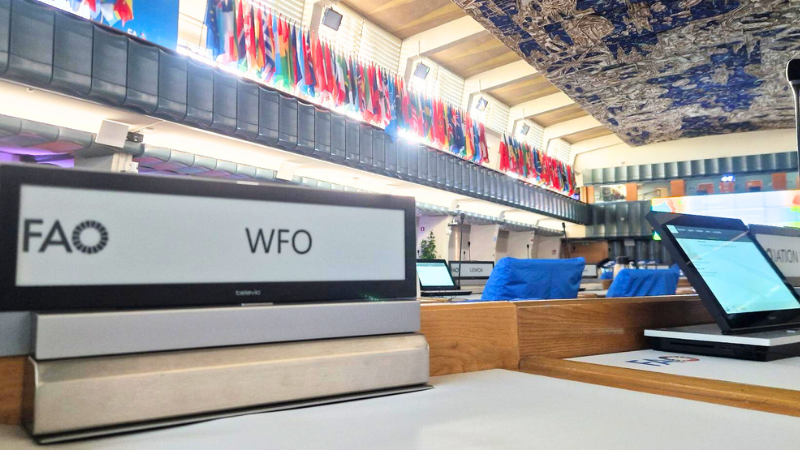From September 25 to 27, 2023, the first-ever Global Conference on Sustainable Livestock Transformation was organised by the Food and Agriculture Organization of the United Nations (FAO) at its headquarters in Rome, Italy.
The conference gathered representatives from FAO member countries, farmer and producer organizations, academic institutions, development agencies, civil society groups, and private sector entities.
At the very core of the agenda was a discussion on innovations and pathways to efficiently produce more nutritious, safe and accessible animal-source foods with a reduced environmental footprint.
Ultimately, the conference was meant as a platform to explore possible ways and connect relevant stakeholders for the development of robust and diverse livestock systems that can better withstand shocks and disruptions while contributing to the achievement of the Sustainable Development Goals (SDGs).
The agenda of the three-day event included three representatives of the World Farmers’ Organisation (WFO), namely, Ms Elizabeth Nsimadala, WFO Board Member for the Africa Constituency; Ms Arianna Giuliodori, the Secretary General; and Dr Frédéric Leroy, a member of the WFO Scientific Council. who brought the farmers’ perspective into the conversation.
The speaker list also featured Jesus David Ocampo Gonzalez, the Secretary of Rural Youth for the National Association of Goat Farmers from Panama, and Noi Paulina Selepe, the Chairperson of the Lesotho Young Farmers Association, who are part of the wider WFO youth network.
The WFO Delegation attending the event also included representatives of WFO Members, members of the WFO Scientific Council and members of the WFO Secretariat.
Throughout the Conference and during meetings with relevant partners and institutions the WFO stressed the need to place farmers at the very core of the transformation.
Speaking about the farmers may not be enough to ensure a transformation will take place; speaking with the farmers is essential to ensure any transformation will be sustainable.
Governments and other relevant stakeholders must learn from farmers’ experience in the field; involve them in the decision-making process; and provide them with the means and resources they need to continue feeding the world while stewarding the environment.
Let’s go deeper!
Monday 25, Opening Session
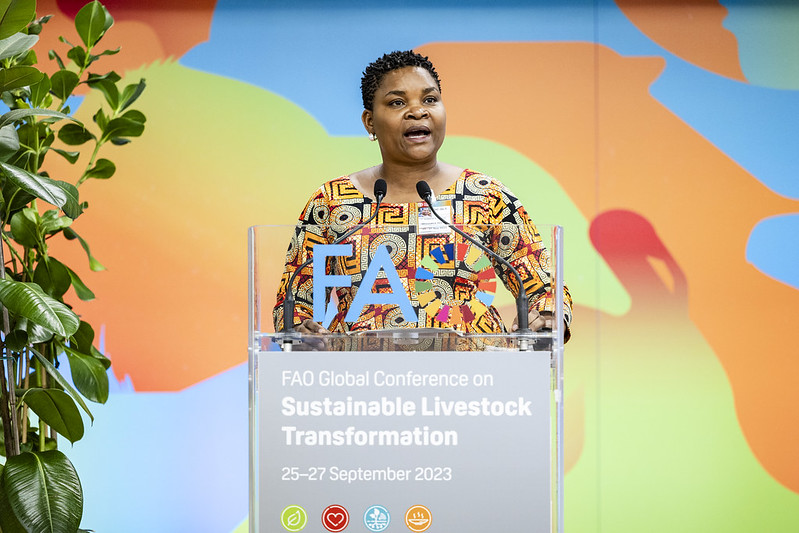
Photo credit: ©FAO/Giuseppe Carotenuto
Following FAO Director-General Mr QU Dongyu’s opening remarks, WFO Board Member Ms Elizabeth Nsimadala delivered a compelling keynote emphasizing the crucial role Sustainable Livestock plays in Africa where – in addition to significantly contributing to its GDP – it provides food security and livelihoods for about one-third of Africa’s population.
Furthermore, she remarked on the pivotal role livestock plays, not just in promoting global health through its protein supply, but also by offering employment opportunities in the food value chain and social integration among communities worldwide
Ms Nsimadala deplored the low-funding traditionally directed towards the livestock sector and urged to increase, rethink and unlock investments to address global and local farmer challenges, especially for women and young entrepreneurs.
On behalf of the global farmers’ community, she called upon governments to invest in local solutions to tackle global challenges, emphasizing the need to shield the livestock sector and the people who depend on it from far-fetched discussions about substituting animal-source proteins with artificial alternatives.
She closed her speech with a strong invitation to institutions to listen to the farmers: “We have ignored the livestock sector for far too long, and we need affirmative action going forward in terms of protection, investments, technologies, R&I, capacity and partnerships at scale”.
WATCH THE LIVE RECORDING HERE: https://www.fao.org/webcast/home/en/item/6258/icode/
Tuesday 26, Session 3 “Better Nutrition”
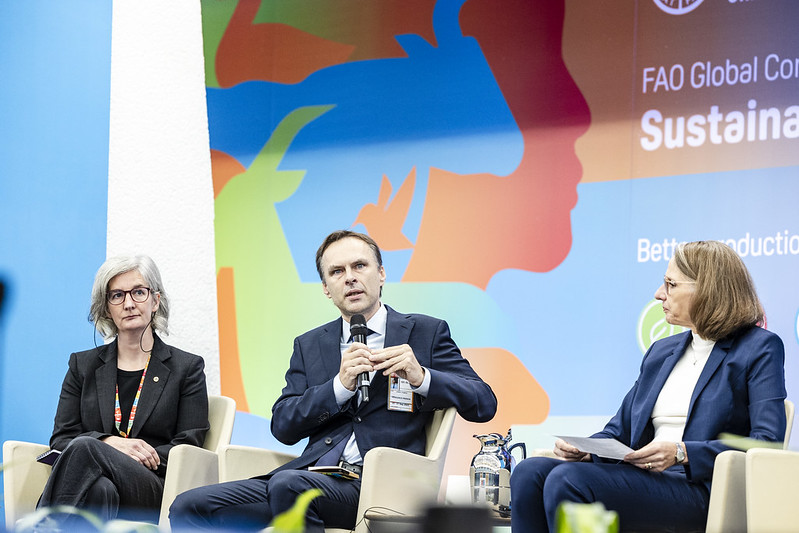
Photo credit: ©FAO/Giuseppe Carotenuto
On the second day of the FAO Global Conference on Sustainable Livestock Transformation, Dr Frédéric Leroy, a member of the WFO Scientific Council, joined the session focused on “Better Nutrition”.
WFO Scientific Council is an independent scientific body composed of scientists, experts, and professors from across the globe to equip WFO with the best scientific advice to enhance further the science-sound perspectives of the farmers’ voice in the international debate around agriculture and food systems.
Dr Leroy shed light on the complexity of the relationship between diets and health: “We need evidence-based discussions that take into account nutrient adequacy and are evidence-based on the target. There’s a difference between children and teenagers and annual donors, or elderly and young women… Those differences need to be considered but it’s also interesting how many individual differences we notice.”
He invited the audience to be wary of simplistic solutions, blanket recommendations, and the suggestion of global dietary standards because they not only undermine people’s health but also entire economic sectors.
In conclusion, Dr Leroy laid emphasis on the importance of interdisciplinary research linking production and consumption, calling for a greater integration of environmental and nutritional sciences as well as ‘biological’ and ‘cultural’ anthropology. The study of the individual human body must be combined with that of the culture and traditions of the specific population group to which the individual belongs: “You can come up with as many recommendations as you want if the cultural background doesn’t accept it, it will not be taken up.”
WATCH THE LIVE RECORDING HERE: https://www.fao.org/webcast/home/en/item/6260/icode/
Wednesday 27, Session 5 “Better Life”
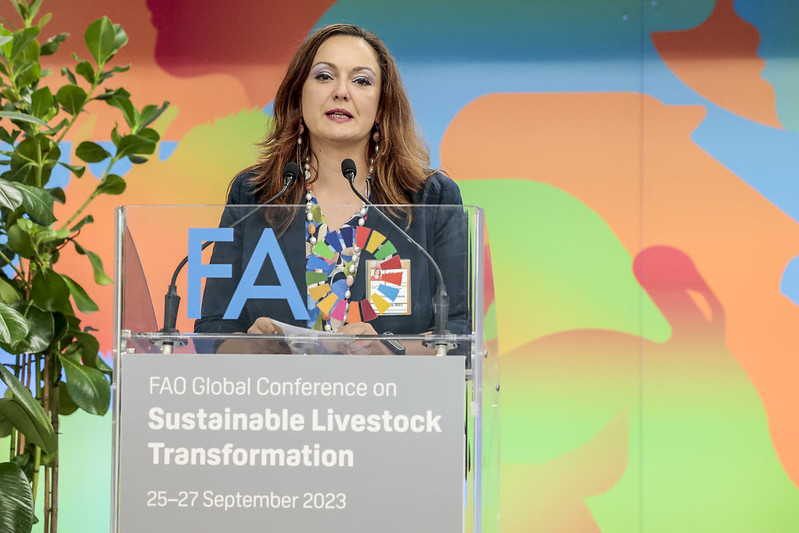
Photo credit: ©FAO/Cristiano Minichiello
The last day of the FAO Global Conference on Sustainable Livestock started with a passionate address from World Farmers’ Organisation Secretary-General, Ms Arianna Giuliodori, who chaired the opening session.
She started by emphasizing the pivotal role of farmers in the sustainable livestock transformation and invited the panellists to use that moment of debate to “put the farmers, the pastoralists, the herders, the youth, and the women at the very centre, not only of the conversation but of the Sustainable Livestock transformation.”
WFO SG stressed that this inclusive approach is also crucial for achieving the 2030 Agenda goals, remarking that “farmers can’t do it alone. It’s time for all stakeholders to join hands and forces.”
She expressed her staunchest support to the active involvement of young representatives in shaping the future of the livestock sector, emphasizing that their choices today will shape the food systems of tomorrow.
Acknowledging the vital role of women in sustaining life and communities, Ms Giuliodori highlighted the often-unrecognized burden they carry and the importance of recognizing their contributions.
Furthermore, the WFO Secretary General urged farmers to step up and share their knowledge, wisdom, and solutions with other stakeholders and emphasized the importance of farmers as economic actors, calling for their central involvement in decision-making processes.
In a resounding call to action, she emphasized the necessity of reverting the paradigm in food systems to place people, particularly farmers, at the centre of decision-making processes. This shift towards inclusivity and collaboration marks a significant stride towards a more sustainable and equitable future in Livestock Agriculture.
WATCH THE LIVE RECORDING HERE: https://www.fao.org/webcast/home/en/item/6262/icode/
Global Youth Dialogue on Sustainable Livestock Transformation
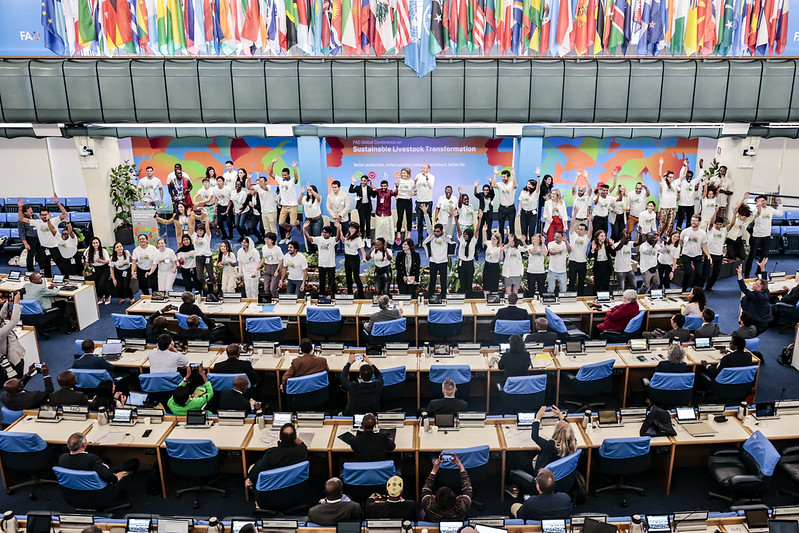
Photo credit: ©FAO/Cristiano Minichiello
Concurrently, as part of the Global Conference on Sustainable Livestock Transformation framework, FAO collaborated with UNIMED – Mediterranean Universities Union to organize the Global Youth Dialogue on Sustainable Livestock Transformation.
A group of young representatives from the World Farmers’ Organisation – including Ana Carolina Zimmermann, a young livestock farmer from Brazil who was a member of the WFO Gymnasium program, Josiane Irakarama, a young farmer from Rwanda and a Gymnasium Alumna, and João Ricardo de Morais Neto a WFO Advocacy, Policy and Partnership intern working on WFO youth issues – actively participated in the dialogue.
The 100 young people engaged in the Global Youth Dialogue on Sustainable Livestock Transformation reached a unanimous agreement on a statement outlining recommendations that cover various aspects such as science, investments, social considerations, economic sustainability, environmental sustainability, and the increased involvement of youth in policy and innovation processes.
The statement recognises the positive impact of sustainable livestock on the environment and the need to invest more in the sector to ensure its sustainability from all three pillars and calls on governments to adopt holistic, science-based and producers-oriented approaches for sustainable livestock transformation.
Additionally, the youth committed to continue this work as a group, bringing their energy, creativity and inclusivity and requested an official youth representation within the Sub-Committee on Livestock, a newly significant component of FAO’s Committee on Agriculture, which is one of FAO’s central governing bodies.
Many of the issues brought up at the conference will be on the agenda for discussion during the upcoming second session of the COAG Sub-Committee on Livestock, scheduled for May 2024.
